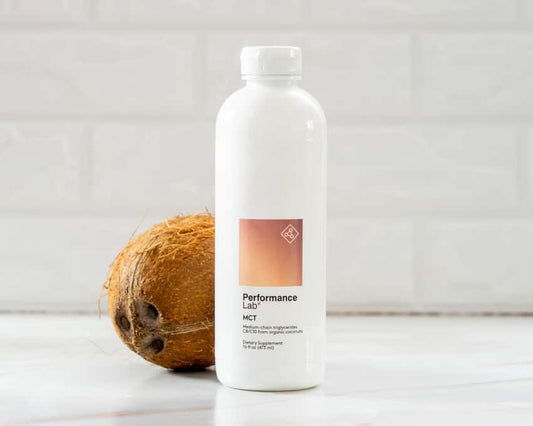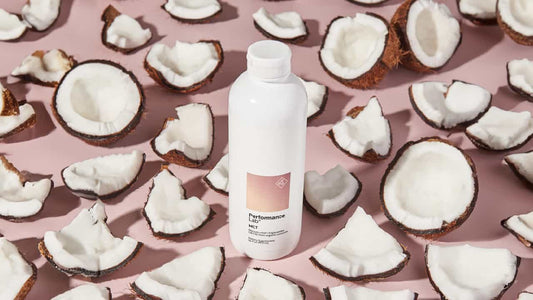Whether or not you’re into the keto world, MCT oil has become the next big miracle worker - and it’s become trendy among athletes and bodybuilders looking for optimal health and maximum performance.
Contrary to the long-standing position that fat is the enemy, MCT oil is not. There’s an abundance of research on nothing but the positive benefits of consuming fat.
But here’s the thing - MCT oil is missing from most people’s diets. Because it’s found in only a few natural sources, you’re consuming minimal, if any, unless you’re supplementing.
It’s one of the best sources of clean fuel for the mind and body and a superb way to power up your performance. So, we’re covering the details now if you’re wondering how long MCTs will stay in your system and elicit their benefits.
What is MCT Oil?
Primarily derived from coconut oil, medium-chain triglycerides, commonly shortened to MCTs, are a type of triglyceride or fatty acid. While they’re concentrated in coconut products, they’re also found in palm oil and smaller amounts in dairy.
Generally speaking, you’ll find MCTs alongside short-chain and long-chain fatty acids in natural food sources. Still, when you’re getting a product that’s 100% MCT oil, you’re only getting medium-chain fats.
Four fatty acids make up the medium-chain triglycerides:
- Caproic acid (C6)
- Caprylic acid (C8)
- Capric acid (C10)
- Lauric acid (C12)
In most cases, MCT products comprise only two MCTs: caprylic acid and capric acid; some products will isolate it further and deliver pure C8 oil or C10 oil, while others tend to do a blend.
For example, most blended MCT oils contain 50-80% caprylic acid and 20-50% capric acid but exclude caproic acid and lauric acid for palatability. Additionally, caprylic acid tends to be the primary fat in MCT oil because of its shorter length, which increases absorption.
Compared to long-chain fatty acids, like those found in olive oil, MCTs are smaller in molecular weight, water-soluble, and rapidly oxidized for energy 1. So, when you’re looking for a solid MCT product to deliver all the benefits these fats offer, you want something pure.
Performance Lab MCT is fast-acting metabolic fuel derived from C8 and C10 MCTs only to deliver peak mind and body performance.

MCT is sourced from 100% organic, non-GMO coconuts, cold-extracted with hexane-free technology, and 3X distilled for purity to provide quick energy without fear of dodgy origins and contamination.
But before diving into why MCTs have blown up the health and wellness field, we first need to understand how they’re metabolized compared to other fats.
MCT Metabolism
Where triglycerides are concerned, there are three we talk about: short-chain fatty acids (SCFAs), medium-chain fatty acids (MCFAs), and long-chain fatty acids (LCFAs).
They’re all metabolized differently and serve different purposes in the body. SCFAs are made of zero to five carbons and are produced in the gut and consumed through food.
They’re known for supporting gut health, as they ferment fiber in the colon to provide energy for 2. Long-chain fatty acids (13-21 carbons) come from food sources like oils.
Long-chain fats are metabolized in the intestine and incorporated in chylomicrons that travel through the lymph system before being absorbed into the bloodstream and utilized or stored 3.
Medium-chain fats, however, are absorbed intact. They do not enter chylomicrons but are instead absorbed directly from the gut.
Unlike other fats, they don’t stimulate the release of cholecystokinin (CCK), a hormone that triggers bile release emulsify fats, but are instead absorbed through passive diffusion along the gastrointestinal tract directly into the portal circulation 1.
These fats do not need to be modified before being absorbed and utilized. Because the absorption process is faster and more efficient than other fats, they provide a rich source of immediate metabolic fuel.
Related Post: Does MCT Oil Break A Fast?
Benefits of MCT Oil
If you’re looking for the super fat of all fats, you’ll find it with MCT. While olive oil has been touted as one of the most heart-friendly and beneficial fats around, MCT oil is quickly climbing the ranks thanks to a hefty list of potential benefits:
- May promote weight loss
- Provides an immediate energy source
- May reduce lactic acid buildup
- Helps manage symptoms of epilepsy, Alzheimer’s disease, and autism
- Fights yeast overgrowth and bacterial infections
- May reduce risk factors for heart disease
- Improve blood sugar management
- Supports digestion and nutrient absorption
How Long Does MCT Stay In Your System?
Downing a tablespoon or two of MCT oil may provide a somewhat immediate boost of energy, but if you’re looking for an exact time that MCT oil stays in your system, you’ll be hard-pressed to find a clear answer. Because fat and ketone metabolism differs between people, there won’t be a consistent time frame.
However, a study published in The Journal of Nutrition found that MCT oil can increase blood ketone levels up to 18-fold just one hour after consumption 4.
Although there’s no concrete time that MCT oil stays in your system, some evidence suggests ketone levels can remain elevated for up to four hours after taking MCT oil.
Final Thoughts
Now is your chance if you haven’t hopped on the MCT bus. Whether you follow a keto or low-carb diet, MCT oil is an excellent addition for anyone looking to reap the benefits the fat has to offer. Better brain health, fewer cravings, more energy, better workout performance - what more could you want?
But unlike certain nutrients that have a degradation time in the body, MCT oil isn’t as straightforward. While absorption is rapid, the effects tend to last a relatively short period, so if you’re looking for long-term benefits, get familiar with the various ways to incorporate MCT into your day.
References
- Shah ND, Linketkai BM. The Use of Medium-Chain Triglycerides in Gastrointestinal Disorders. Practical Gastroenterology. 2017 Feb;160:20-28.
- Cook SI, Sellin JH. Review article: short chain fatty acids in health and disease. Aliment Pharmacol Ther. 1998;12(6):499-507.
- Beermann C, Jelinek J, Reinecker T, Hauenschild A, Boehm G, Klör HU. Short term effects of dietary medium-chain fatty acids and n-3 long-chain polyunsaturated fatty acids on the fat metabolism of healthy volunteers. Lipids Health Dis. 2003;2:10. P
- Yeh YY, Zee P. Relation of ketosis to metabolic changes induced by acute medium-chain triglyceride feeding in rats. J Nutr. 1976;106(1):58-67.















